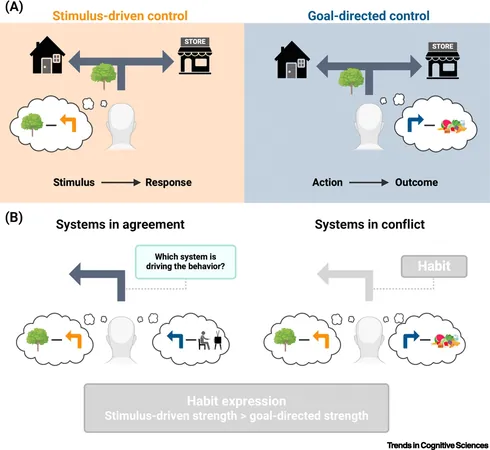
Groundbreaking Research Reveals How to Master Your Habits for Life
2024-11-19
Author: Sarah
Introduction
Cognitive neuroscientists at Trinity College Dublin have unveiled a pioneering framework that could transform the way we understand and change our habits. This remarkable new blueprint not only aims to improve our personal development but also holds promise for treating compulsive disorders like obsessive-compulsive disorder (OCD), addiction, and eating disorders.
The Study
The study, spearheaded by Dr. Eike Buabang under the guidance of Professor Claire Gillan at the School of Psychology, highlights the powerful brain mechanisms that influence our behaviors. Their research paper, titled "Leveraging cognitive neuroscience for making and breaking real-world habits," recently graced the pages of the esteemed journal Trends in Cognitive Sciences.
Key Insights
In Dr. Buabang's words, “Our habits govern various aspects of our daily lives—from that first morning coffee to the routes we take to work and our bedtime rituals. Our findings shed light on the compelling nature of these automatic behaviors and how we can leverage brain functionality to enact change. We synthesized decades of research from controlled environments and real-world scenarios to understand habit formation in the human brain.”
Brain Mechanisms
The research underscores that two critical brain systems shape our habits: one responsible for automatic reactions to familiar stimuli and another that enables conscious, goal-oriented control. For instance, mindlessly scrolling through social media signals the operation of the automatic response system, while intentionally putting the phone down to concentrate on work engages the goal-directed control system.
An intriguing insight from this study is how an imbalance between these two systems can lead to unintentional behavior slips, such as mistyping an old password. Moreover, the research suggests that this disruption can escalate into compulsive actions found in various psychological conditions.
Habit Formation
Both beneficial and detrimental habits emerge when automatic responses overshadow our purposeful intentions. By dissecting this dynamic, individuals can harness this knowledge deliberately to cultivate positive habits and dismantle negative ones.
Framework for Change
This innovative framework details several elements that influence the equilibrium between automatic responses and goal-directed actions. These include:
1. **Repetition and Reinforcement**: Consistent practice strengthens the link between environmental stimuli and our responses. Rewarding desired behaviors augments their likelihood of recurrence, while the same principle can be applied to overwrite undesirable habits with new, competing automatic responses.
2. **Environmental Adjustments**: Modifying one’s environment can encourage habit change. For example, making healthy snacks easily accessible fosters better eating habits, whereas eliminating tempting cues can deter harmful behaviors.
3. **Goal-Directed Engagement**: Learning how to engage our conscious control strengthens or weakens our habits. For instance, allowing for distractions like listening to podcasts can accelerate habit formation during exercise. Conversely, external stresses can reignite old patterns, emphasizing the need for mindfulness while attempting to break habits.
Practical Applications
Dr. Buabang further elaborates, “Our study introduces a new 'playbook' for behavioral transformation by merging scientific insights with practical applications. It highlights effective strategies, such as implementation intentions (if-then plans) and incorporates clinical techniques like exposure therapy and habit reversal therapy, aiming not only to consolidate existing methods but also to inspire new interventions.”
Personalized Treatment
This research provides promising avenues for personalized treatment plans, recognizing that individuals vary in their habit formation and dissolution processes. Professor Gillan notes, “Recognizing the unique neurobiological makeup of each person allows for tailored interventions—perhaps focusing on avoiding triggers, or managing stress differently, will yield better results for some.”
Public Health Implications
Moreover, the implications of these findings extend to public health strategies, potentially guiding policymakers in crafting more impactful health campaigns. By understanding the brain's role in habit formation, we can promote healthier lifestyle choices—such as regular exercise and reduced sugar intake—making them more instinctive at both individual and community levels.
Conclusion
“By aligning our strategies with the natural workings of our brains in habit formation, we can cultivate healthier choices, making them easier to adopt and maintain,” concludes Dr. Buabang. This research not only empowers individuals to take charge of their habits but also sets a foundation for societal health improvements—an exciting breakthrough in cognitive neuroscience!






 Brasil (PT)
Brasil (PT)
 Canada (EN)
Canada (EN)
 Chile (ES)
Chile (ES)
 España (ES)
España (ES)
 France (FR)
France (FR)
 Hong Kong (EN)
Hong Kong (EN)
 Italia (IT)
Italia (IT)
 日本 (JA)
日本 (JA)
 Magyarország (HU)
Magyarország (HU)
 Norge (NO)
Norge (NO)
 Polska (PL)
Polska (PL)
 Schweiz (DE)
Schweiz (DE)
 Singapore (EN)
Singapore (EN)
 Sverige (SV)
Sverige (SV)
 Suomi (FI)
Suomi (FI)
 Türkiye (TR)
Türkiye (TR)